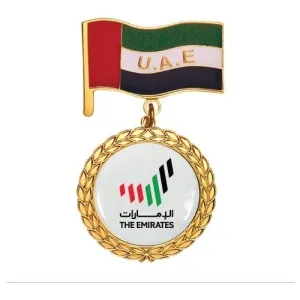Understanding How Gifts Matter in the Middle East
The Cultural Significance of Gift Giving in the Middle East- Navigating Cultural Norms for Effective Marketing
Gift-giving has been an integral part of human society for centuries, serving as a means of expressing gratitude, fostering social connections, and strengthening relationships. In the Middle East, the practice of gift giving holds profound cultural significance, deeply rooted in traditions, religious beliefs, and societal norms. Understanding the intricacies of gift-giving in the Middle East is essential for businesses aiming to navigate the market successfully and build meaningful relationships with consumers. This essay explores the cultural significance of gift giving in the Middle East and offers insights into how businesses can navigate cultural norms for effective marketing strategies.
Cultural Significance of Gift Giving in the Middle East
In the Middle Eastern culture, gift-giving is far more than a mere exchange of material possessions; it is a symbolic gesture laden with meaning and significance. The act of giving and receiving gifts is deeply ingrained in the region's social fabric, reflecting values such as hospitality, generosity, and reciprocity.
One of the primary reasons for gift-giving in the Middle East is to honor relationships and express appreciation. Whether it's a gesture of gratitude for hospitality received or a token of goodwill to mark a special occasion, gifts serve as tangible expressions of respect and affection. In business settings, gift-giving is often used to strengthen bonds with clients, partners, and colleagues, fostering trust and loyalty in professional relationships.
Moreover, gift-giving in the Middle East is closely intertwined with religious and cultural traditions. Islamic festivals such as Eid al-Fitr and Eid al-Adha are occasions of joy and celebration, marked by the exchange of gifts among family members, friends, and neighbors. During these festivals, the act of giving gifts is not only a manifestation of generosity but also a reflection of religious values such as compassion and solidarity.
Navigating Cultural Norms for Effective Marketing
For businesses operating in the Middle East, understanding and respecting cultural norms around gift-giving is crucial for successful marketing strategies. Here are some key considerations:
Cultural Sensitivity: Businesses must demonstrate cultural sensitivity when selecting gifts for Middle Eastern recipients. Certain items may be considered inappropriate or offensive due to cultural or religious beliefs. For example, alcohol and pork-related products are generally avoided as gifts, as they contradict Islamic dietary laws. Similarly, gifts with overly personal connotations or extravagant value may be perceived as inappropriate in some contexts.
Symbolism and Meaning: In the Middle East, the value of a gift goes beyond its material worth; it is the thought and sentiment behind the gesture that truly matters. Businesses should prioritize gifts that hold symbolic meaning and resonate with the recipient's interests and preferences. Personalization and customization can further enhance the significance of the gift and strengthen the emotional connection between the giver and the recipient.
Timing and Occasions: Understanding the appropriate occasions for gift-giving is essential in Middle Eastern culture. Islamic holidays, family celebrations, and significant life events such as weddings and births are opportune moments for presenting gifts. Businesses should align their marketing efforts with these occasions, offering promotions and gift options that cater to the festive spirit and cultural significance of the event.
Building Relationships: Gift-giving is a powerful tool for building and nurturing relationships in the Middle East. Businesses should view gift-giving not merely as a transactional exchange but as an opportunity to cultivate trust, goodwill, and long-term loyalty among customers and stakeholders. By demonstrating genuine appreciation and thoughtfulness through their gifts, businesses can foster stronger connections and differentiate themselves in the market.
Moreover, the act of gift-giving is viewed as a form of social currency, with reciprocation playing a significant role in maintaining harmony and balance within relationships. When someone receives a gift, it is not only a gesture of kindness but also an implicit obligation to reciprocate in kind, thereby perpetuating the cycle of giving and receiving. This reciprocity extends beyond individual interactions to encompass broader social networks, contributing to the interconnectedness of communities and reinforcing social cohesion.
Gift-giving in the Middle East is deeply ingrained in cultural traditions and holds significant importance in fostering relationships and expressing gratitude. Hospitality, generosity, and reciprocity are fundamental values associated with the practice, making it a crucial aspect of social interaction. Whether it's exchanging gifts during Islamic festivals like Eid al-Fitr and Eid al-Adha or presenting tokens of appreciation in business settings, the act of giving gifts serves as a tangible expression of respect and affection, strengthening bonds between individuals and communities.
Understanding and respecting cultural norms is paramount for businesses aiming to incorporate gift-giving into their marketing strategies effectively. Cultural sensitivity is key when selecting gifts, as certain items may be deemed inappropriate due to religious or cultural beliefs. Moreover, businesses must consider the symbolism and meaning behind gifts, prioritizing gestures that resonate with recipients' interests and preferences. By aligning gift offerings with appropriate occasions and demonstrating thoughtfulness in their selection, businesses can navigate cultural nuances and enhance the emotional connection with their target audience.
Beyond mere transactions, gift-giving in the Middle East is a vehicle for building lasting relationships and social cohesion. Reciprocity plays a significant role, as receiving a gift implies an obligation to reciprocate, fostering a cycle of giving and receiving within communities. Businesses can leverage this social currency to cultivate trust, goodwill, and loyalty among customers and stakeholders. By viewing gift-giving as an opportunity to connect on a deeper level and contribute to the interconnectedness of society, businesses can harness its power to drive engagement and success in the Middle Eastern market.
Conclusion
Gift-giving plays a central role in Middle Eastern culture, serving as a means of expressing respect, gratitude, and social connection. For businesses operating in the region, understanding and navigating the cultural norms surrounding gift-giving is essential for effective marketing strategies. By demonstrating cultural sensitivity, prioritizing meaningful gestures, and building genuine relationships with customers, businesses can successfully leverage the power of gift-giving to drive engagement, loyalty, and brand success in the Middle East.
Spotlight on Trending Promo Gear
Browse the most popular and trending Corporate Gifts




















